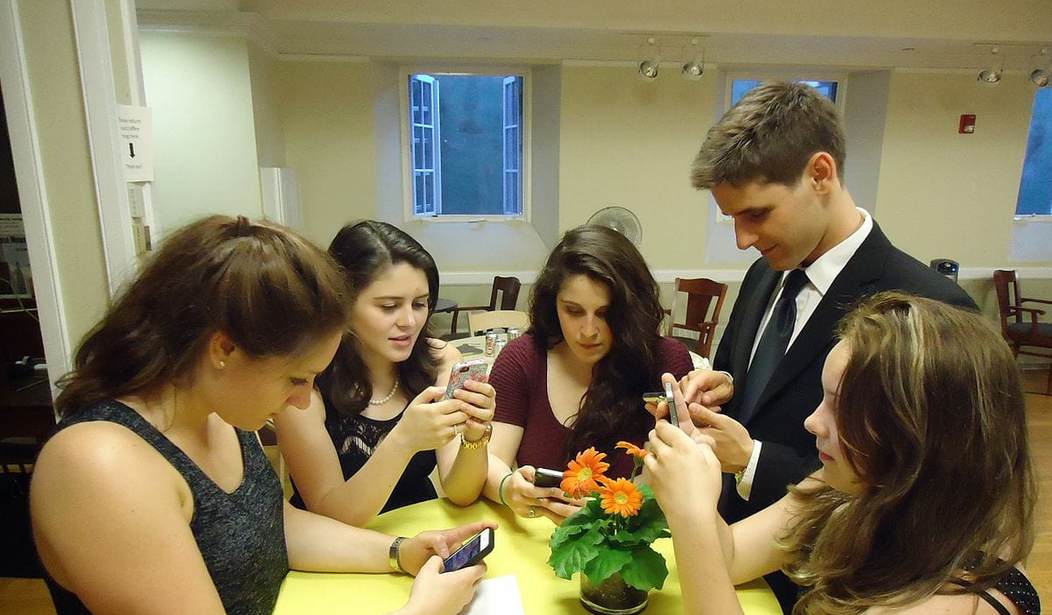The generation which started coming of age in the 21st century faces a world vastly different from the one in which previous generations grew up. Children and young adults today have never known an America without tablets, smart phones, ongoing military conflict, ever-present terrorism threats after September 11, a jobless recovery to a devastating recession, unprecedented globalized trade, increasing protests in an age of prosperity, medical advances that have greatly extended our quality and length of life, and constant sharing over social media. Even the older Generation Y — the first stage of millennials, generally born between the early 80s and the mid 90s — have had their very lifestyles and social interactions transformed by technology.
Anecdotally, I see this all the time. I spoke with one college freshman last year who said she had never owned a computer, and did all her coursework on a tablet and smart phone. I suspect she’s representative of a larger trend towards more mobile and connected technology.
Millennials are now becoming parents. How are new parents dealing with all of this? Previous generations don’t necessarily have all the answers anymore, so in many cases, new parents have to make it up as they go along. The basics are, of course, the same, but dealing with technology is a brave, new world.
Here are 7 ways millennials are doing parenting differently.
1. The work-life balance is more important.
More millennials than members of previous generations say that work-life balance is important. In large part, this is due to the rise of households with two working parents. Gone are the days when roles are mostly delineated between breadwinner and homemaker. Because of the financial pressures involved in maintaining a household, the reduced buying power of the dollar, and the stagnation of wages in real dollars, maintaining a home and family on one income is harder than ever before.
In a recent survey of millennial parents, 76 percent of men and 74 percent of women said that work-life balance was important. This comes as more millennials than any other generation report that achieving that balance is more difficult.
2. The nature of work is changing.
More than a quarter of millennials work longer hours after having a child. This is occurring at the same time that work is changing. Telecommuting is becoming a regular part of our routine — 37 percent of workers telecommute at least two days per month. On top of that, in the new gig economy, a.k.a. the sharing economy, a.k.a. the “side hustle”, workers are under decreasing pressure to show up at a workplace at all.
New ways of generating revenue by repurposing existing assets are being invented all the time. Between Uber and Lyft — repurposing your vehicle — to Airbnb — repurposing your couch or a spare room — there are all sorts of new, flexible ways to generate revenue without punching a time clock and reporting to a boss. This flexibility affords parents all sorts of new ways to stay involved in parenting that didn’t exist a few years ago.
3. Technology is everywhere.
Parents today are using technology for everything. This has yielded both positive and negative effects. More than half (58 percent) of millennials say that they are overwhelmed by the amount of parenting information available on the Internet. And yet, millennial parents are turning more and more to YouTube for advice on a wide range of parenting conundrums.
Among a generation in which 40 percent are parents, it’s interesting to note that more millennial dads are watching parenting videos on YouTube than moms.
4. Dads are more involved.
Comedian Jay Mohr had a sports talk radio show for a couple of years before moving on a few months ago. He talked a lot on that show, and in his standup routines, about how this is the first generation of kids in America who were told openly by their parents that they are loved. Previous generations of children were satisfied with mere grunts of vague approval from a dad coming home after a long, arduous day at work.
Pew Research reports that dads are spending way more time than ever before on housework and parenting duties, while their overall hours worked per week has dipped slightly over the past 50 years.
5. Millennials consciously try to break down traditional roles.
Today, fully 80 percent of millennial parents say that their child is one of their best friends. And yet, millennials are much more concerned about helicopter parenting than previous generations. More than half (61 percent) of millennial parents think that kids need more unstructured play time, while only 21 percent think that their children are “overscheduled.”
More millennials are likely to think that it is not necessary to be married before having children, and way more millennial parents than previous generations have bought genderless toys for their children. And yet, not all those roles are being turned on their head — 48 percent of millennial parents think children are raised best by a stay at home mom.
6. Millennials are much more social.
Millennials are much more likely to share, and to care about what others think about them and their parenting skills. As they break down traditional parenting roles, they also fear being judged by their peers — while also being much more likely than previous generations to share pics and personal info on social media. In a way, it almost seems as if traditional, in-person socialization is being replaced by virtual socialization via social media.
7. More likely stay-at-home parents.
Despite all the evidence about changing traditional parenting roles, raising children differently than previous generations, and sharing more personal information than ever before, some things have not changed. Millennials still believe that a stay-at-home mom does the best job of raising a kid — 48 percent responded favorably, while the rate of stay at home parenting has increased over Generation X (23 percent vs 16 percent).










Join the conversation as a VIP Member